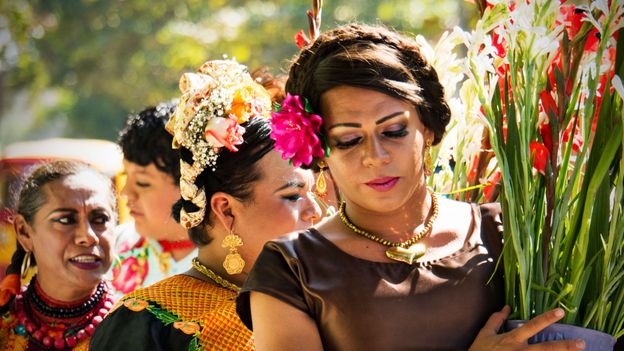
[ad_1]
The third gender of southern Mexico
(Image credit: Zofia Radzikowska)

In Oaxaca’s Istmo de Tehuantepec region, the traditional indigenous division of three genders is seen as a natural way of being.
“Which form should I use when I talk to you: feminine or masculine?” I asked Lukas Avendaño, who I had seen in trousers earlier in the day but now was wearing a traditional black skirt with colourful embroidered flowers called an enagua. We were speaking in Spanish, with its gendered nouns and pronouns. “I prefer you’d just call me sweetheart,” Avendaño giggled.
Here, in the Istmo de Tehuantepec region in Mexico’s southern state of Oaxaca, there are three genders: female, male and muxes. This third classification has been acknowledged and celebrated since pre-Hispanic times, and it’s hard to imagine life without muxes here. But in this region where most people speak the indigenous Zapotec language, my question doesn’t make much sense.
“In Zapotec, as in English, there are no grammatical genders. There is only one form for all people. Muxes have never been forced to wonder: are they more man or woman?” Avendaño explained.
“We’re the third sex,” added Felina, who, unlike Avendaño, decided to change his given male name, Ángel, and goes only by this moniker. “There’s men and women and there’s something in between, and that’s who I am.”

In the Istmo de Tehuantepec region in Mexico’s southern state of Oaxaca, there are three genders: female, male and muxes (Credit: Zofia Radzikowska)
You may also be interested in:
• The islands where women make the rules
• China’s kingdom of women
• The shipwreck that created a culture
I was at Vela de Las Intrepidas (Vigil of the Intrepids), the annual celebration of muxes that takes place each November in Juchitán de Zaragoza, a small town on the Istmo de Tehuantepec. Observing the different muxes, I couldn’t see much in common between their styles. There were muxes who, like the local tehuanas (women from the Istmo de Tehuantepec), wore the same richly embroidered outfits that inspired Frida Kahlo’s unique look. Others seemed to prefer Western-style dresses or drag queen apparel. And there were some wearing men’s clothes, showing their status with just simple makeup and nail polish.
“It’s hard to describe who a muxe is. Basically, we can say that a muxe is any person who was born a man but doesn’t act masculine,” Avendaño said.
“What we know, ‘under Western eyes’, as ‘male-to-female transvestite’, ‘male-to-female transsexual’, ‘effeminate gay’ or ‘masculine gay’ seems to be included within the category of ‘muxe’ as long as there is also a strong component of ethnic identity,” writes anthropologist Pablo Céspedes Vargas in his article Muxes at work: between community belonging and heteronormativity in the workplace. Avendaño similarly emphasised that ‘muxe’ is a Zapotec term and it can’t be understood without knowing more about their culture.
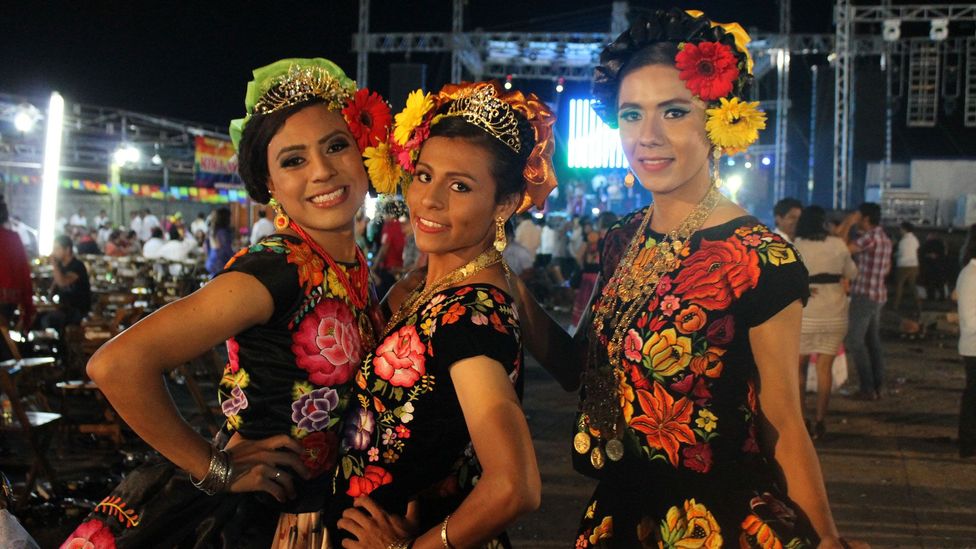
The Vela de Las Intrepidas (Vigil of the Intrepids) takes place each November in Juchitán de Zaragoza (Credit: Ola Synowiec)
That’s because the concept of muxe exists only here, on the Istmo de Tehuantepec, where they are an important part of the community. Some say they fell out from the pocket of Vicente Ferrer, the patron saint of Juchitán, as he passed through town, which, according to locals, means they were born under a lucky star. A second version of the saint’s legend says that Vicente Ferrer was carrying three bags: one with female seeds, one with male seeds and one where the two were mixed. According to this story, the third bag sprung a leak in Juchitán, and that’s the reason why there are so many muxes here.
“It’s not true there are more of them here. They’re just more respected, so they can be more visible,” said Fernando Noé Díaz, a primary school teacher who has many muxe friends. One named Kika (who also only goes by her first name) had invited us for tonight’s vela. There, each muxe had a section with tables and decorations where food and drinks were served to their guests. “I guess muxes are so respected because they are more a social gender rather than a sexual one. They have an important role in the community,” Noé Díaz added.
Juchitán is famous throughout Mexico for its strong and proud women. Some even call it a matriarchy, which is not necessarily correct, but women traditionally handle the money brought home by the men. (Locals joke that men here have sweet or salty penises, meaning they are either farmers or fishermen.) Women, on the other hand, are supposed to sell what men produce, and the market is their domain. Tonight, as is vela tradition, women traditionally donate money as a gift, while the men carry cases of beer.
“When the man is at sea or in the field and the woman is at the market, there is no-one to take care of the household and family. That’s where the muxe comes in,” Noé Díaz explained. “Some even say it’s a blessing for a mother to have a muxe son who will help her at home and take care of young siblings. Also, muxes are socially not allowed to have long-term relationships or get married so they can stay with their mothers when they get old.”
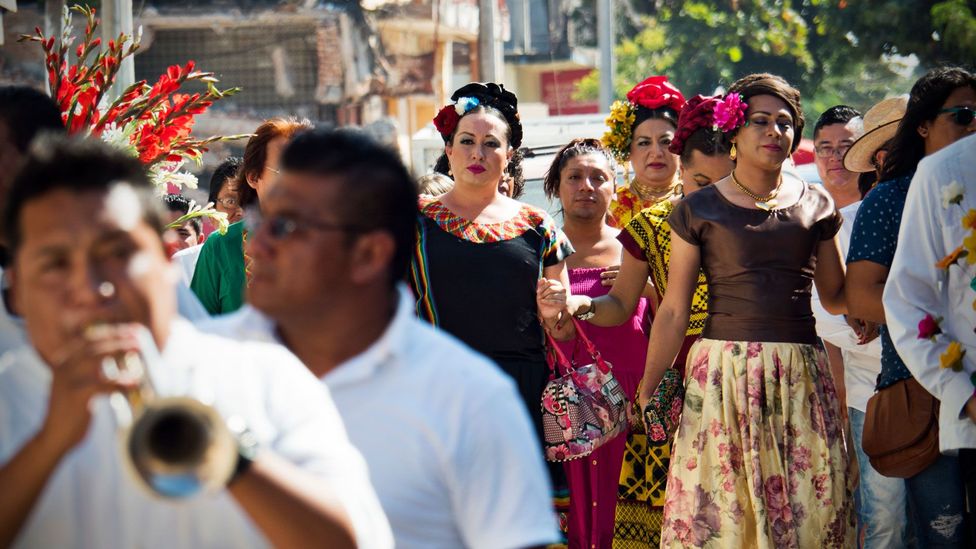
Some say muxes fell out from the pocket of Vicente Ferrer, the patron saint of Juchitán, as he passed through Juchitán (Credit: Zofia Radzikowska)
At the vela, the mothers are the ones who serve food at each muxe’s table. Kika’s mother was checking that nobody was hungry, and younger family members gave me a new bottle of beer when mine started to empty. But Kika didn’t want to dedicate herself to housework, as is one of the muxe’s traditional roles, along with handicrafts and selling at the market. She owns a beauty salon in the centre of the town. The same with Felina, who runs a muxes’ group, Las Auténticas Intrepidas Buscadoras del Peligro (The Authentic Intrepid Danger Seekers), the organisers of tonight’s vela.
According to Noé Díaz, a lot of muxes work preparing the traditional fiestas that are a big part of the local economy. They make costumes and ornaments for velas, baptisms, communions, quinceañeras (15th birthday parties) and weddings. Noé Díaz also knows muxes who dedicate themselves to creating art and handicrafts to sell at markets. Another of his muxe friends is a primary-school teacher.
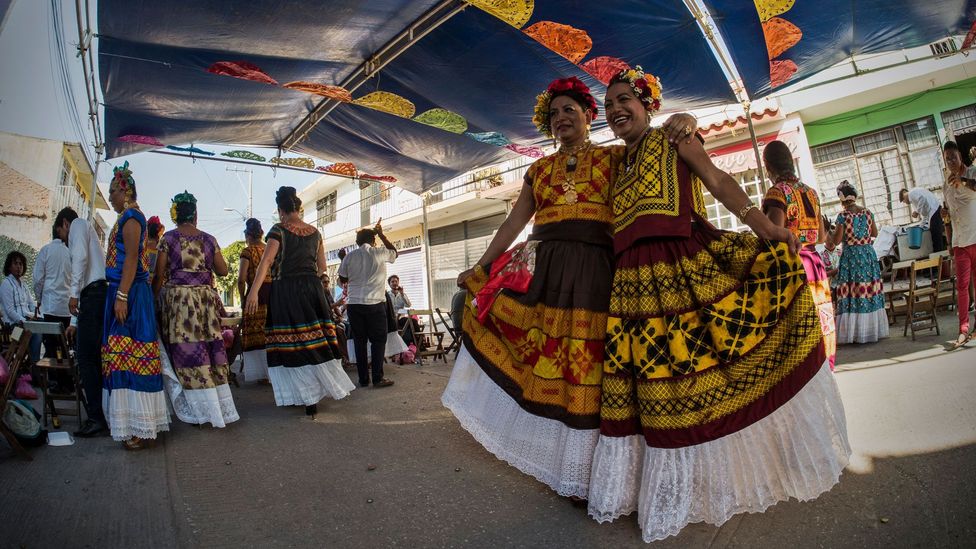
Fernando Noé Díaz: “It’s not true there are more of them here. They’re just more respected, so they can be more visible” (Credit: Zofia Radzikowska)
Avendaño is an actor and director who travels the world with his show about being a muxe, Réquiem para un Alcaraván (Requiem for an Alcaravan). The spectacle puts a lot of emphasis on the Catholic part of the muxe identity.
“Muxes have always had an important role in the local Catholic church. It was their job to prepare the church decorations. In Tehuantepec, the town I come from, muxes have their own brotherhood inside the church,” Avendaño said, explaining that the Catholic Church wisely accommodated the tradition of three genders that is so strong and deeply ingrained in the local culture.
Today’s celebration started with a holy mass in honour of muxes at the local church of Vicente Ferrer.
“God created woman and man, but he also created human nature, and – please forgive me, God, if I offend you – it’s possible that the nature created by him decided who humans are. And among people, there are homosexuals and it’s totally natural,” said ‘Padre Panchito’, as parish priest Arturo Francisco Herrera González is nicknamed, while he delivered his homily. “God created us in his image, and each one of us is unique. There are no two identical individuals and we have to respect that,” he stated.
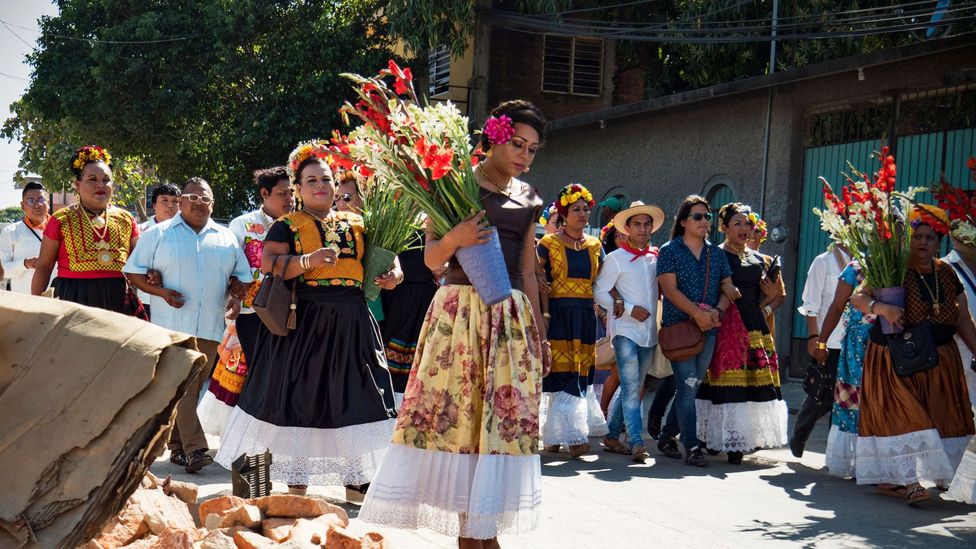
A lot of muxes work preparing the traditional fiestas that are a big part of the local economy (Credit: Zofia Radzikowska)
After mass, the traditional procession began through the streets of the town. The colourful crowd was led by a band and muxes carrying candles. Behind them, more muxes rode in cars and trucks decorated with flowers, balloons and paper decorations. But the highlight of the day was the party that took place at night outside town. There were three stages and big speakers. I could see many people: women, men and children. Everyone was wearing regional clothes: women in enaguas and embroidered blouses called huipiles; men in white guayabera shirts. All were welcomed on the stage by a muxe who was this year’s ‘la mayordomo’, the main organiser of the vela, who was accompanied by their partner who is a mayate. Mayates are men who have sexual relationships with muxes, but aren’t muxes themselves and are not considered gay.
“An important difference with urban Western sexual culture is that for Zapotecs, only sexual relationships between a muxe and a heterosexual male have meaning. Relations between muxes or between a muxe and a gay man don’t make sense, in fact they are even inconceivable. No muxe would sleep with a man who considers himself gay,” writes Marinella Miano Borruso in an article Entre lo local y lo global. Los muxe en el siglo XXI (Between local and global. Muxes in the 21st Century). “Zapotec society as a whole doesn’t perceive a man who has relations with a muxe as a homosexual, his hetero-status is not questioned.”
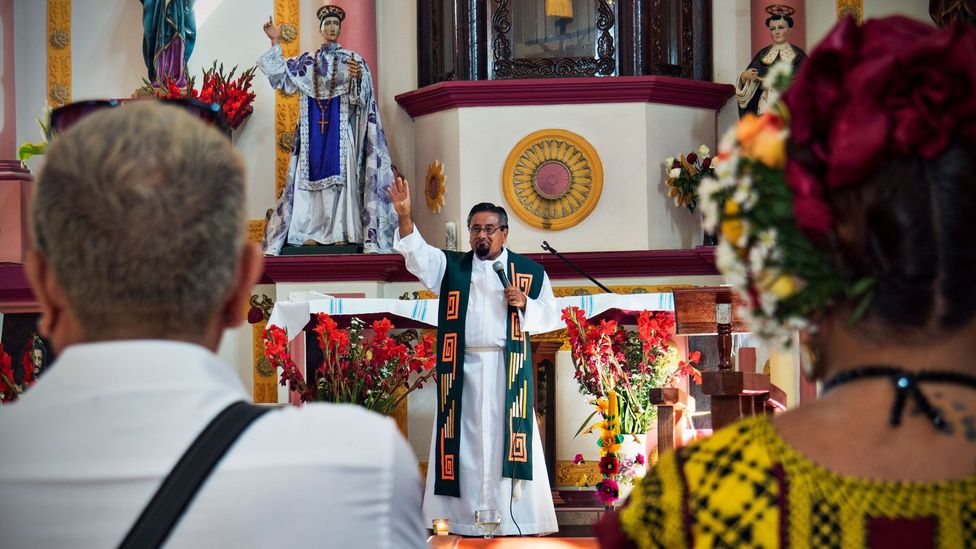
Muxes also play an important role in the local Catholic Church, making decorations for baptisms and weddings (Credit: Zofia Radzikowska)
According to Miano Borruso, historically muxes didn’t have to be homosexual. There were cases of them being heterosexual, bisexual or asexual. “Traditionally, being muxe didn’t depend on sexual orientation. It’s a cultural gender, social function and identity, but not a characteristic of someone’s desires,” she explains in her book Hombre, mujer y muxe en el Istmo de Tehuantepec (Man, woman and muxe in Istmo de Tehuantepec).
Nonetheless, all the muxes I talked to at the vela considered themselves homosexual or as a woman born in a male body. Some transform themselves with hormone therapy and implants. During the annual Queen of the Muxes contest, which formed part of the vela, I noticed many of them had artificial breasts. “That’s something new. Fake boobs don’t make a muxe more muxe,” Noé Díaz commented.
Muxes have also been involved in the struggle for LGBT rights. Amaranta Gómez Regalado, a muxe from Juchitán, was a local candidate in the elections for the Mexican Congress. Even though she didn’t get enough votes, she became famously known as the first transsexual candidate of Mexico. She’s still involved in politics, especially in campaigns against homophobia and for HIV/AIDS prevention.
“Instead of dedicating our lives to embroidery, handicraft or street sales, more and more of us are getting higher education,” Felina said. “If we, the daughters of St Vicente, won’t fight for our rights, then who will?”
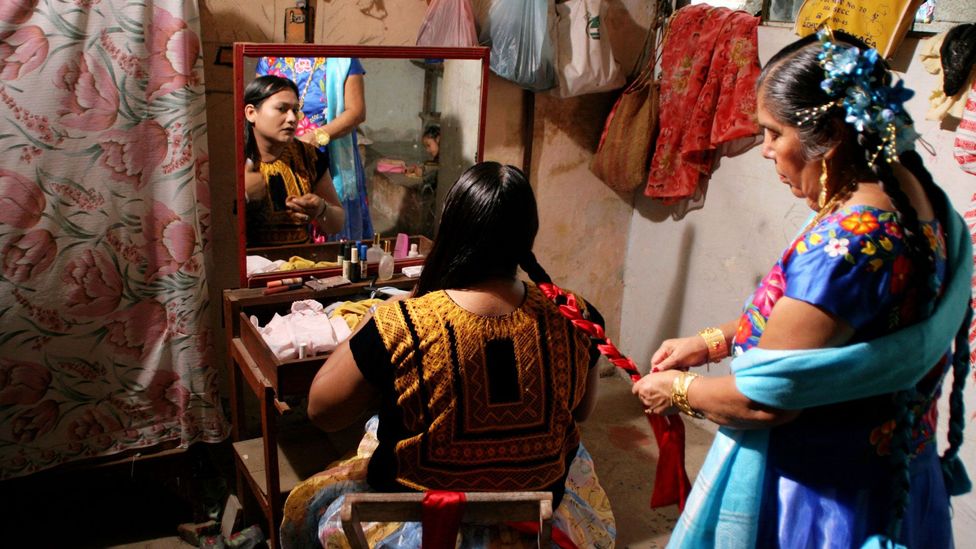
For the Mexican and international gay community, Juchitán has become a symbol of tolerance (Credit: blickwinkel/Alamy)
Still, Mexicans have been ambivalent towards homosexuals in general. On one hand, Mexico City was the first Latin American capital to legalise same-sex marriage. Yet Mexico also suffers one of the highest rates of crime against the LGBT community in the world, with 202 people murdered due to homophobia between January 2014 and December 2016 – which equates to one every three to four days.
For the Mexican and international gay community, Juchitán has become a queer paradise and a symbol of tolerance. Even though some locals still discriminate against muxes, and the muxe community as a whole has less opportunity to study and gain employment, the traditional indigenous division of three genders as a natural and traditional way of being has inspired the LGBT scene around the world – and muxes are becoming aware of it.
“We dedicate this night not only to muxes,” I hear from the stage. “It’s also your night, for all homosexuals, not just for the ones from the state of Oaxaca, but for all gays from all over the world. Juchitán is open to all of you.”
Our Unique World is a BBC Travel series that celebrates what makes us different and distinctive by exploring offbeat subcultures and obscure communities around the globe.
Join more than three million BBC Travel fans by liking us on Facebook, or follow us on Twitter and Instagram.
If you liked this story, sign up for the weekly bbc.com features newsletter called “If You Only Read 6 Things This Week”. A handpicked selection of stories from BBC Future, Earth, Culture, Capital and Travel, delivered to your inbox every Friday.
[ad_2]
Source link




/cloudfront-us-east-2.images.arcpublishing.com/reuters/ARHZ5EW6L5LVVIRTRRXQNLFDWA.jpg)










